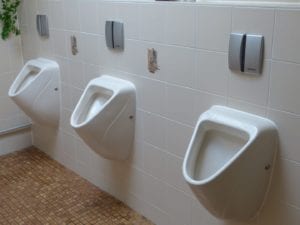The City of Cape Town will replace 5 000 automatic flushing urinals across the city with waterless ones. The project will save an estimated 20 million litres of water per year.
As part of a pilot project, R30 000 worth of waterless urinals have already been installed in city-owned buildings in Parow and Goodwood. The city’s Water and Sanitation Department has now begun the process for the large-scale roll-out of waterless urinals at city-owned buildings and public ablution facilities across the city. “Our commitment to building a well-run city, where the conservation of our scarce environmental resources is a priority, is to the benefit of all our residents – now and into the future,” says the city’s Mayoral Committee Member for Utility Services Cllr Ernest Sonnenberg. The type of waterless urinals preferred by the city work with downward pressure and a flexible rubber tube which clamps shut, thereby eliminating odours. The lifespan of these devices is two years, but if properly maintained they can last longer. Approximately 5 000 automatic flushing urinals (AFU) across the city will be gradually replaced with waterless urinals, with the first few hundred to be installed in the current financial year.Sonnenberg explains that one AFU uses approximately half a litre of water with each flush. Most AFUs are set to flush twice an hour for about 12 hours every day which amounts to 12 litres per day or 4 380 litres per year. Waterless urinals only require approximately a litre of clean water on a daily basis to rinse the urinal basin. “These calculations demonstrate the obvious benefit of the waterless devices to the city and its residents alike,” says Sonnenberg.
Furthermore, waterless urinals require significantly less maintenance and have a longer lifespan. The councillor has urged the private sector, particularly hotels and restaurants, to make use of this technology where possible to significantly improve the city’s water footprint.







